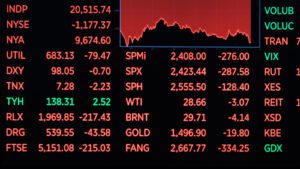
Traders are waiting for the speech of the head of the U.S. Federal Reserve (Fed) Jerome Powell, which will be held on Wednesday evening, as well as assess statistical data from China and follow the news about the restrictions related to the spread of coronavirus infection in the country, and large-scale protests against them.
Chinese authorities the previous day announced plans to more actively vaccinate the elderly population against the coronavirus, shortening the time between vaccinations for those over 80 years old to three months.
The Shanghai Composite stock index was up 0.06% by 7:22 a.m. KSC and the Hang Seng of Hong Kong was up 0.8%.
China’s Purchasing Managers’ Index (PMI) for the manufacturing industry fell to 48 points in November from 49.2 points a month earlier, the fastest pace since April, data from China’s State Bureau of Statistics (SBS) showed.
Experts on average had expected it to drop to 49 points, Trading Economics noted.
The service sector PMI fell to 46.7 points in November, also the fastest pace since April. In October, its value was 48.7 points.
Growth leaders in Hong Kong are shares of automaker Geely Automobile Holdings Ltd. (+8.6%), telecom China Unicom Ltd. (+6.25%) and restaurant chain owner Haidilao International Holding Ltd. (+3.7%).
Japan’s Nikkei 225 stock index was losing 0.35% by 7:22 a.m. KSC.
Japan’s industrial output fell 2.6% in October compared to the previous month, preliminary statistical data showed. The decline in industrial production was recorded for the second month in a row. In September the index decreased by 1.7%.
Experts on average expected a decrease in industrial production in October by 1.5%, according to Trading Economics.
Leaders of the decline are securities of Tokyo Electric Power Co. Holdings Inc. (-3.3%), construction materials producer Sumitomo Osaka Cement Co. Ltd. (-3.3%) and game developer Konami Group Corp. (-2.9%).
South Korea’s KOSPI was up 1.1% by 7:24 a.m. KSC.
South Korean industrial production fell 3.5% month-over-month in October. The rate of decline was the fastest since May 2020. In September, the figure was down 1.9%. Experts had forecast a 1% decline in industrial production in October.
Retail sales in the country fell 0.2% in October relative to the previous month after falling 1.9% in September.
Shares of the world’s biggest chip and consumer electronics maker Samsung Electronics Co. rose 1.5% and automaker Hyundai Motor Co. rose 0.3%.
Australia’s S&P/ASX 200 index added 0.4% on Wednesday.
Australia’s consumer price index (CPI) rose 6.9% year on year in October, official data showed. The rate of growth slowed from a 7.3 percent rise in September, which was the highest since at least September 2018, Trading Economics wrote.
Experts on average had predicted a 7.4% rise in the index.
Share prices of the world’s largest mining companies BHP and Rio Tinto rose by 1.6% and 1.7%, respectively.
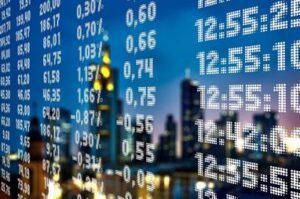
Asia-Pacific region (APR) stock indices are steadily rising on Tuesday, with the exception of the Japanese indicator.
The markets of China and Hong Kong are rising following a jump in developer shares after restrictions on the sector were eased the day before.
China Securities Regulatory Commission (CSRC) said on Monday it had lifted a multi-year ban on listed developers to sell shares in the domestic market in order to raise funds to pay debts and M&A deals.
The decision was made to support a “stable and sustainable” development of the sector, the CSRC said.
“These measures are likely to accelerate the consolidation of real estate companies,” said China Index Holdings expert Liu Shui.
Shares of major Chinese real estate developer Country Garden Holdings Co. jumped 8.2 percent in Hong Kong trading.
China Vanke gained 12.2% in Hong Kong and 10% in Shenzhen, Gemdale gained 5.1% and 10% in Hong Kong and Shanghai respectively and Greenland Holdings gained 5.3% and 10%.
The Shanghai Composite stock index rose 2% in trading, the Shenzhen Composite rose 2.2% and Hong Kong’s Hang Seng gained 4%.
The Chinese market is also supported by growing expectations of traders that Beijing will ease quarantine restrictions after last weekend’s mass protests in the country.
“Expectations are growing that China’s zero-tolerance COVID-19 policy is over, and that’s improving traders’ sentiment,” notes Kiyong Song, a Societe Generale analyst in Hong Kong, cited by Bloomberg.
The value of securities of Chinese alcohol producer Kweichow Moutai rose by 5.4%. On the eve, the company announced its intention to pay a special dividend of 21.91 yuan ($3.06) for the first time since its shares were listed on the stock exchange in 2001.
Japan’s Nikkei 225 stock index was losing 0.5 percent in trading amid weak statistical data.
Japan’s retail sales rose in October for the eighth month in a row, but the rate of increase slowed compared to September and was worse than analysts’ expectations.
According to the Ministry of Economy, Trade and Industry, retail sales rose 4.3% last month compared with October 2021. They were up 4.8% in September. Experts polled by Trading Economics predicted an average increase of 5 percent.
Retail sales rose 0.2% from the previous month after climbing 1.5% in September.
Unemployment in Japan in October remained at 2.6%, while analysts expected its reduction to 2.5%.
Leaders of the decrease are shares of technological companies: SoftBank Group securities fell by 1.4%, Tokyo Electron – by 1.2%, Keyence Corp. – by 1.6% and Advantest – by 1.7%.
Shares of Toyota Motor (-1.2%), Sony Group (-1%), Mitsubishi Corp. (-0.9%) also fell in price.
The Australian S&P/ASX 200 added 0.3% on Tuesday, while South Korea’s KOSPI gained 0.9%.
BHP Group shares gained 2.1%, Rio Tinto – 3.5% and Pilbara Minerals – 1.6%.
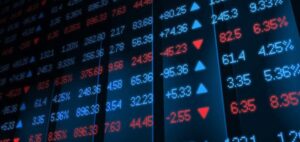
Stock indices of major Asia-Pacific countries are mainly down in trading on Monday except Japan Indicator amid a decline of Wall Street last week due to concerns about further interest rate hikes in the United States.
Investors fear that multiple key rate hikes by the U.S. Federal Reserve (Fed) and central banks in Asia and Europe to combat high inflation could push the global economy into recession, Trading Economics wrote.
By 8:17 Moscow time the value of Japanese index Nikkei 225 increased by 0.02%.
The most significant rise among the components of the indicator was demonstrated by share prices of beer producer Sapporo Holdings Ltd. (+2.9%), chemical company Teijin Ltd. (+2.8%) and insurer Tokio Marine Holdings Inc. (+2.3%).
By 8:21 Moscow time, China’s Shanghai Composite Index was down 0.7 percent and Hong Kong’s Hang Seng was down 2.1 percent.
The People’s Bank of China (NBK, the country’s central bank) kept its benchmark one-year lending rate (LPR) at 3.65% per year.
The rate for five-year loans was left at 4.3 percent per annum, the NBK said in a statement.
The regulator left the rates unchanged amid continued downward pressure on the yuan and a slowdown in economic activity amid rising coronavirus infections and new restrictions or lockdowns in a number of cities, Trading Economics wrote.
In Hong Kong, stocks of companies providing consumer goods and services declined significantly on Monday as investors’ attention shifted back to the coronavirus situation amid a rise in infections and the first report of a fatality from the effects of COVID-19 in nearly six months, Trading Economics wrote.
Hong Kong Chief Executive John Lee tested positive for COVID-19 after returning from the Asia-Pacific Economic Cooperation (APEC) summit in Thailand, the PRC Special Administrative Region government said.
According to the statement, Lee tested negative for COVID-19 all four days he was in Thailand. However, upon his arrival at Hong Kong airport, the head of the special administrative region’s administration received a positive test.
Leaders of the decline on the Hong Kong Stock Exchange include shares of restaurant chain owner Haidilao International Holding Ltd (-7.5%) and casino operators Sands China (SPB: 1928) Ltd (-7.4%) and Galaxy Entertainment Group Ltd (-7.3%).
The value of South Korea’s Kospi index by 8:15 Moscow timeframe dropped 1.3%.
One of the world’s largest chip and electronics maker Samsung Electronics Co. dropped 1.5%, while car maker Kia Corp. dropped 1.7%.
Australia’s S&P/ASX 200 index fell 0.17%.
Share prices of the world’s largest mining companies BHP and Rio Tinto fell by 2.25% and 2.3%, respectively.
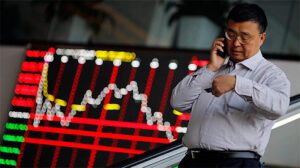
Stock indices of major Asia-Pacific countries (APR) mostly fell in trading on Thursday.
The exception was the Australian index, which rose amid statistical data showing an improvement in the unemployment rate in the country.
Pressure on other markets again have concerns about the negative impact of China’s tough policy in the fight against coronavirus, notes MarketWatch.
The value of Japanese index Nikkei 225 decreased by 0.35% by close of trading.
The volume of Japanese exports in October increased by 25.3% over the same month last year to 9.002 trillion yen (about $ 64 billion), according to the Ministry of Finance. The rise continues for 20 months in a row. At that, the growth rate slowed down from 28.9% in September.
Analysts on average had expected exports to rise 28.1% last month, according to Trading Economics.
Japanese imports soared 53.5% last month to a record 11.165 trillion yen. Analysts on average had forecast a 49.7% increase after a 45.7% rise in September. The index has been rising at a double-digit percentage rate for 18 consecutive months.
Shares of nonferrous metals producer Sumitomo Metal Mining Co. Ltd. (-5.4%), semiconductor maker Advantest Corp. (-3.1%) and electronics maker Tokyo Electron Ltd. (-3%).
Shares of Hitachi Ltd. rose 0.6%. The company’s unit won a major railroad contract worth about 114 billion yen ($817 million) from the Philippine Department of Transportation.
China’s Shanghai Composite index was down 0.15% and Hong Kong’s Hang Seng was down 1.2%.
Shares of game developer Netease Inc. (-9.1%), Internet company Meituan (-5.7%) and car dealer Zhongsheng Group Holdings Ltd. (-5.4%) were among the leaders of the decline on Hong Kong Stock Exchange.
Tencent Holdings Ltd. shares declined 0.8 percent. The Chinese internet giant increased its net profit by 1 percent to 39.9 billion yuan ($5.6 billion) in the third quarter compared with the same period a year ago because of a cut in expenses.
South Korea’s Kospi index fell 1.4 percent.
One of the world’s biggest chip and electronics maker Samsung Electronics Co. dropped 2.1%, while automaker Hyundai Motor dropped 1.2%.
Australia’s S&P/ASX 200 Index was up 0.09%.
Australia’s seasonally adjusted unemployment rate unexpectedly fell to 3.4% in October from 3.5% a month earlier. Experts polled by Trading Economics, on average, forecasted an increase to 3.6%.
Share prices rose in all four major banks in the country: the Commonwealth Bank of Australia – by 0.7%, Australia & New Zealand Banking Group – 0.5%, Westpac Banking – 0.2%, National Australia Bank – 0.9%.
At the same time stock quotes of the world’s largest mining companies BHP and Rio Tinto fell by 1.6% and 1.8%, respectively.
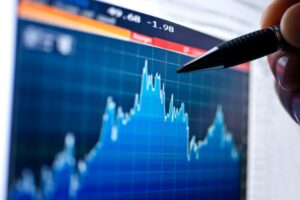
Asia-Pacific stock indices are rising in trading on Monday.
Investors continue to monitor the quarterly earnings season and evaluate fresh statistics from China.
China’s Shanghai Composite index was up 0.4 percent by 8:20 a.m. Hong Kong Hang Seng added 3.6%.
Traders remained optimistic amid unconfirmed reports last week that Chinese authorities may start loosening covid restrictions and abandon its zero-tolerance COVID-19 policy in March. However, Beijing made clear over the weekend that it is still committed to a tough fight against the coronavirus, Trading Economics wrote.
Meanwhile, Goldman Sachs experts think that the optimism of market participants may persist for 2 to 3 months and the market itself may grow by 20% due to this.
Shares of semiconductor maker Hua Hong Semiconductor Ltd. jumped 16%. The company plans to list on the Shanghai Stock Exchange and may raise up to $2.5 billion.
On the Hong Kong Stock Exchange, shares of developer Country Garden Holdings Co. Ltd. (+13.4%), optical device maker Sunny Optical Technology Group Co. Ltd. (+8.4%) and biopharmaceutical Wuxi Biologics (Cayman) Inc. (+7.7%).
China’s exports in October fell 0.3% year on year to $298.37 billion, according to the General Administration of Customs of the People’s Republic of China. Analysts polled by The Wall Street Journal had forecast a 4% increase. It added 5.7% in September.
Imports fell 0.7% year on year to $213.17 billion in October after rebounding 0.3% in September. Economists had expected the figure to be unchanged last month. China’s foreign trade surplus reached $85.2 billion in October, compared with $84.7 billion a month earlier and $84.8 billion a year earlier. Experts estimated the October surplus at $95.8 billion.
Japan’s Nikkei 225 was up 1.2% by 8:35 a.m.
Shares of toy maker Sanrio Co. that owns the Hello Kitty brand are up 13%. The company increased its net profit 1.5 times in the first fiscal year and improved its full-year outlook.
Also among the leaders in the Japanese indicator are securities of JFE Holdings Inc.(+7.5%) investing in the steel business, transport and logistics company Kawasaki Kisen Kaisha Ltd. (+6.6%) and printer maker Konica Minolta Inc. (+5.8%).
Sharp Corp., the Japanese unit of electronics maker Foxconn Technology Group, was down 2.7 percent. The company reported a net loss last quarter and cut its outlook for the year.
South Korea’s Kospi index was up 0.9 percent by 8:45 a.m.
The stock price of Samsung Electronics Co., one of the largest chip and electronics makers in the world, rose 1.2%, the value of Hyundai Motor jumped 4%.
Australia’s S&P/ASX 200 index rose 0.6% on Monday.
Share prices of the world’s largest mining companies BHP and Rio Tinto added 5% and 3.8% respectively.
Meanwhile, Coronado Global Resources Inc. shares are down 7% on news that the company terminated merger talks with U.S.-based Peabody Energy Corp.
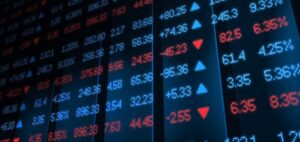
Stock indices of the countries of the Asia-Pacific region fall at the auction on Thursday, following the dynamics of the US stock market.
Exchanges in Japan are closed due to the celebration of the Day of Culture in the country.
Investors evaluate the results of the November meeting of the US Federal Reserve System. The American Central Bank expectedly raised the interest rate by 75 basis points, now its range is 3.75-4% per annum. It was increased by this amount following the results of the fourth meeting in a row. The rate is now at its highest level since January 2008.
At the same time, the Fed pointed to the possibility of slowing down the pace of rate hikes in the future. Fed Chairman Jerome Powell said at a press conference after the meeting that the issue would likely be discussed at the December meeting or early next year.
The Chinese Shanghai Composite index fell by 0.6% by 7:05 a.m. The Hong Kong Hang Seng lost 2.8%.
PC maker Lenovo Group is down 0.8%. The company in the second financial quarter increased net profit by 6%, but reduced revenue by 4%.
Papers of pharmaceutical CanSino Biologics Inc. cheaper by 26.5%. The company said it does not expect strong growth in profits from the sale of China’s first inhaled COVID-19 vaccine due to strong domestic competition and declining global demand.
Shares of other Chinese pharmaceutical companies also fall on this news. Stock quotes CSPC Pharmaceutical Group Ltd. lose 10.1% and lead the decline as part of Hang Seng, Sino Biopharmaceutical (SPB: 1177) Ltd. – decrease by 5.9%.
In addition, the securities of the video game developer Netease Inc. are actively losing in price on the Hong Kong Stock Exchange. (SPB: NTES) (-6.7%), casino operator Sands China (SPB: 1928) Ltd. (-6.1%) and online retailer Alibaba Group Holding (SPB: BABA) Ltd. (-6%).
China’s Purchasing Managers’ Index (PMI) fell to 48.3 in October from 48.5 in September, according to data compiled by Caixin Media and S&P Global. The indicator value above 50 points indicates an increase in business activity, below – its decline. The October indicator is below 50 points for the second month in a row and has updated the minimum since May.
Analysts note that the continued strict coronavirus restrictions in China contribute to the decrease in activity.
The South Korean index Kospi fell by 0.12% by 7:25 a.m.
Quotes of securities of one of the world’s largest manufacturers of chips and electronics Samsung Electronics Co. decrease by 0.5%, the cost of automaker Hyundai Motor decreased by 2.1%.
The Australian S&P/ASX 200 fell 1.8% on Thursday.
Share prices of the world’s largest mining companies BHP and Rio Tinto lost 3.1% and 2.3%, respectively.